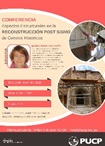
The main issues related to the management of post-earthquake situations are concerned with bringing to light the qualities of the place, combatting depopulation, environmental decay and social impoverishment, and improving the condition of the cultural heritage and landscape. Thus, a correct methodology has to be applied, studying the history and evolution of the area affected by the seismic event and its architectural, morphological and urban features. The purpose is to develop an urban fabric consistent with the pre-existing one (also with regard to social aspects), without excluding new solutions. Castelvecchio Calvisio is an historical centre characterized by widespread depopulation and a consequent state of abandonment, where the seismic effects of the 2009 earthquake worsened the situation. After that event, the Reconstruction Plan (PdR) of Castelvecchio Calvisio, i.e. a specific management tool, was put in place. Thanks to that, the urban requalification will be carried out together with the definition of all the actions for structural renovation and seismic improvement, including strengthening. Restoration principles play a fundamental role; in fact all the actions undertaken have to be compatible with the protection of architectural and historical heritage, taking into account material conservation, and respect and protection of structural and original elements. Clustered buildings built of stone constitute the leading structural typology: they ensue from an articulated evolution whose genesis is not always easily recognizable. As a consequence they cannot be studied as simple individual buildings, but a particular methodology has to be applied in order to define intervention criteria and techniques. Restoration assumes a double function: it is involved in the conservation of the existing heritage as an intrinsic value, and at the same time in the design of the new as an added value.
Nombre del visitante:
Maria Rosa Valluzzi
Institución:
Università degli Studi di Padova
País: Italia
Fecha de inicio: 10/11/2016
Fecha de fin: 10/11/2016
